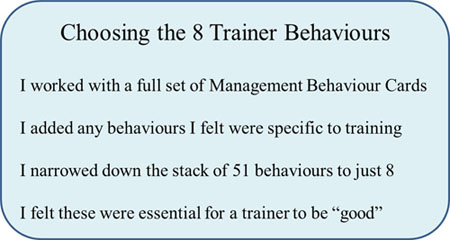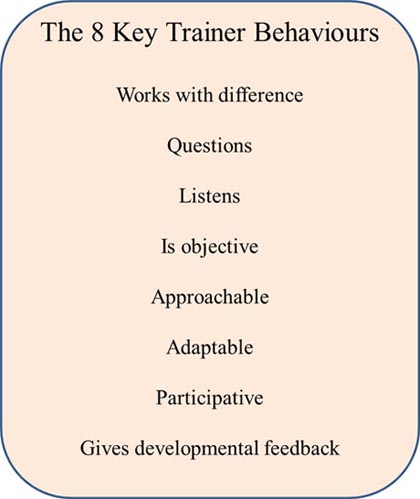
 What Makes a Good Trainer?
What Makes a Good Trainer?
In this second part of this Train the Trainers series I will examine what makes a good trainer and therefore why they need a good train the trainers course.
I started by identifying the key behaviours for a good trainer. To do this I used one of our own products which we sell in our on-line shop, the Management Behaviour Cards.
I used these as the basis of the behaviours on my final list. See the text box on the right if you would like details of the selection process.
The 8 Key Trainer Behaviours
I ended up with 8 behaviours that I consider to be essential to develop in a trainer and thus become part of their train the trainers experiences. You might be able to think of others and that may be because you see things differently to me or you have other priorities in the job.
Works with Difference
This is about diversity in the widest possible meaning of the word. Trainers needs to be good working with people and every person on this planet is different and unique.
It is the job of a trainer to work with this difference and ensure they tailor their behaviour and approach to suit the people mix in the group.
Questions
A good trainer will stop and consider if they can ask a question rather than just give information. Their job is to stimulate learning not show how knowledgeable they are.
Listens
Listening leads to understanding. A key technique for a trainer is to listen, question and then decide what approach they will take.
Is Objective
We all have opinions, bias, preferences, likes and dislikes. A trainer should not show any of these. Their role is to be neutral, to be aware when their stereotypes are being challenged and respond with respect and understanding.
Approachable
Learners need the confidence to be able to ask a question or ask for help when they need it. They will learn faster and retain more if they are relaxed and enjoy the company of their trainer.
Adaptable
A good training session is well researched and designed. However in the hands of a good trainer the session should be adapted to meet the needs of the learners and not just delivered as written.
Participative
Trainers need to interact with their learners and not talk at them. They need to use a variety of learning methods to maintain interest and satisfy different learning styles.
Gives Constructive Feedback
Feedback is important so that learners have an objective view of their performance measured against a standard. Feedback needs to be honest and also presented in a developmental way.
Train the Trainers with the 8 Behaviours
One particular Train the Trainers course is unlikely to cover 8 behaviours. However when looking for a suitable train the trainers course, identify which of the behaviours are being developed and whether or not that suits your needs.
Difference and Diversity
This book is specifically written for trainers on the subject of managing difference as a trainer. Click on the image to follow the link to Lulu where you can purchase this title.
If you enjoyed reading this blog, please share with your friends using the buttons below:





